News
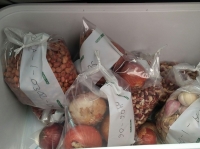
16/07/2020
When tested for 800 chemical residues and contaminants, as part of an FAO study, in most cases, the exposure from food consumed in Benin, Cameroon, Mali and Nigeria did not exceed levels of toxicological concern. However, the study also revealed that several mycotoxins, lead, aluminium, polycyclic aromatic hydrocarbons and a pesticide could be a cause of concern for households in some areas of each of the four African countries.
The findings of this large-scale total diet study, conducted by FAO with technical support of the World Health Organization and Centre Pasteur of Cameroon, are detailed extensively in an article published by The...

06/07/2020
FAO, WHO and the Codex Alimentarius Secretariat jointly facilitated the second observance of World Food Safety Day, which took place on 7 June 2020. To find out what that was like from an FAO perspective, we spoke with Markus Lipp (ML), Head of the FAO Food Safety and Quality Unit, who helped shape the campaign and took part in a number of events.
Q: What was this year’s World Food Safety Day like for you?
ML: World Food Safety Day 2020 was a wonderful experience. We learned from an amazingly large and varied group of activities from all stakeholders. Personally, I participated...
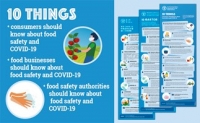
26/06/2020
In March 2020, the Global Food Security Cluster (gFSC) convened an ad-hoc COVID-19 technical working group to coordinate the efforts of gFSC partners in their preparedness and humanitarian response to mitigate the impact of the COVID-19 pandemic on the food security of vulnerable and affected populations. The FAO Food Safety and Quality Unit was called upon to support the development of operational guidance related to food hygiene and food handling targeting vulnerable households and communities affected by the pandemic.
FAO Food Safety and Quality Officer Christine Kopko is among the many FAO experts collaborating with the gFSC, which is co-led by...
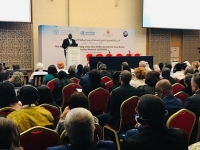
19/06/2020
Through various interactive discussion sessions, the Second Global Meeting of Joint FAO/WHO International Food Safety Authority Network (INFOSAN) strengthened the sense of community among the 300 participants from 135 countries on 9-11 December 2019, as described in the newly released report. Held in Abu Dhabi, United Arab Emirates, the meeting was hosted by the Abu Dhabi Agriculture and Food Safety Authority (ADAFSA) and co-organized by the Food and Agriculture Organization of the United Nations (FAO) and the World Health Organization (WHO).
The report outlines the various sessions of the meeting, which was about bringing together INFOSAN members to discuss recent developments...

17/06/2020
On 12 June 2020, the Joint FAO/WHO Expert Meetings on Microbiological Risk Assessment (JEMRA) paid a short tribute to World Food Safety Day with a video screening. The video was of particular significance because several of the meeting participants had been involved in the recording.
Experts, resource persons and members of the FAO and WHO Secretariats participating in the meeting on Shiga toxin-producing E. coli (STEC), currently underway until 30 June, appeared in the video to explain a bit about the role of scientists in food safety. This message tied in with the overall 2020 theme for the UN day: Food safety, everyone’s business.
JEMRA...
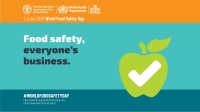
08/06/2020
This year World Food Safety Day celebrations started early – with INFOSAN members gathering for webinars on ‘safe food in markets’ in mid-May – and will run until at least mid-June when the Republic of Korea holds its 19th national celebration of food safety. With limitations on gatherings and travel in many countries due to the COVID-19 pandemic, many of the events that were to be held in person have been moved online. The event that WHO was to host with FAO in Geneva is an example.
In a live session on Facebook on Friday 5 June,...

24/04/2020
Given the current absence of international guidance and regulations, a Joint FAO/WHO Expert Meeting on Tropane Alkaloids was convened remotely on 30 March-3 April 2020 to provide scientific advice that will allow for appropriate risk management options for products used by the World Food Programme in delivering food assistance in emergencies. Tropane alkaloids are a group of compounds occurring in several plant families of the Solanaceae genera that can contaminate staples like cereals and grains. The key discussions and outcomes of the expert meeting have been captured in this executive summary.
This meeting is part of the FAO Scientific Advice Programme,...
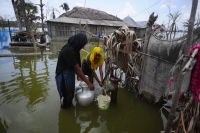
22/04/2020
While the effects of climate change on global food production and food security are widely known, the impacts on food safety are still not well understood. A new FAO publication, Climate change: Unpacking the burden on food safety, sets forth detailed scientific descriptions of how climate change is threatening the safety of food - sourced from both land and sea - and outlines how the exposure to a number of foodborne hazards could increase across the world.“A single environmental factor like increase in temperature can trigger varying degrees of effect on different food hazards globally,” said Keya Mukherjee,...
Stay up to date and connect to our RSS feed!
